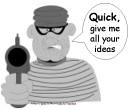 The Thief
The Thief 
Le Voleur is French for the Thief. In 1828, during the birth and rise of the newspaper, Emile de Girardin had a novel idea on how to use the newest writing technology, the printing press. He and a friend decided to start a periodical, but since they lacked capital, the weekly was entitled Le Voleur (The Thief) and it reprinted the best articles that had appeared elsewhere during the week, saving editorial costs. (from ''The History and Power of Writing'')
Monday, October 03, 2005
"George Stephanopolous dropped a bombshell on his show on Sunday. Toward the end, as Judd notes, he said,' Definitely a political problem but I wonder, George Will, do you think it%u2019s a manageable one for the White House especially if we don%u2019t know whether Fitzgerald is going to write a report or have indictments but if he is able to show as a source close to this told me this week, that President Bush and Vice President Cheney were actually involved in some of these discussions. ' The implication is that Bush and Cheney took part in discussions with Karl Rove, Lewis Libby and other administration spinmeisters about what to do about that pesky Joseph Wilson IV, former acting ambassador to Iraq who had stood up to Saddam in fall of 1990. Wilson had gone to Niger in spring of 2002 to check out the stories circulating in intelligence circles that Saddam had bought uranium there recently. Vice President Richard Bruce Cheney (when people are in legal trouble the tradition is to drop the nicknames) had asked the CIA about the stories. Wilson had found that the structure of the uranium industry in Niger (which frankly was in French hands) made the purchases implausible. What Wilson did not know at the time was that the stories were generated by actual documents, a set of clumsily forged letters generated by Italian military intelligence officer Rocco Martini (who claimed he was the tool of 'higher powers.')Wilson wrote his report and assumed it was passed by then CIA direct George Tenet and thence went to Cheney, who had initiated the inquiry. Wilson watched with amazement and outrage as the Bush administration went on relentlessly to hype Iraq's alleged nuclear program as a basis for the Iraq War that they got up. By May of 2003, Wilson had had enough, and he went public with an editorial in the New York Times, in which he told his story.The whole point of Bushism is to punish dissidence within the ranks immediately and ruthlessly. Wilson, a former State Department official, had to be destroyed for having stepped out of line. Everyone should remember that when former Secretary of the Treasury Paul O'Neill decided to come out with a tell-all memoir about being in the Bush cabinet for a year, he proclaimed, 'I'm old, I'm rich, and there is nothing they can do to me' (or words to that effect). Then all of a sudden the Bush administration was finding signs of classified documents in O'Neill's book, implicitly threatening him with spending the rest of his life in jail for having revealed government secrets. O'Neill feebly protested that he had not had access to classified documents. But all of a sudden he disappeared from the airwaves. He had discovered that there were, too, things that could be done to him. He must have been astonished that the Bushes of Kennebunkport would behave like Vladimir Putin. Everyone always underestimates the malevolence of the Bushes of Connecticut."
0 Comments:
GoogleNews Map
NY Times
Cost of the War in Iraq
(JavaScript Error)

| CURRENT MOON lunar phases |
Play Chess
RSS
Fighting the Good Fight
- Democracy Now!
- Crooks and Liars
- Common Dreams
- Money in Politics
- The Drudge Report
- Corporation Watch
- Noam Chomsky
- Info Wars
- Free Press
- Bill of Rights
- US Constitution
- Z Magazine
- Save the Internet
- Military Industrial Complex
- Stop Illegal Spying









2005-02-13
2005-02-20
2005-02-27
2005-03-06
2005-03-13
2005-03-20
2005-03-27
2005-04-03
2005-04-10
2005-04-17
2005-04-24
2005-05-01
2005-05-15
2005-05-29
2005-06-05
2005-06-19
2005-06-26
2005-07-03
2005-07-10
2005-07-17
2005-07-24
2005-07-31
2005-08-07
2005-08-14
2005-08-21
2005-08-28
2005-09-04
2005-09-11
2005-09-18
2005-09-25
2005-10-02
2005-10-09
2005-10-16
2005-10-23
2005-10-30
2005-11-06
2005-11-13
2005-11-20
2005-11-27
2005-12-04
2005-12-11
2005-12-18
2006-01-01
2006-01-22
2006-02-05
2006-02-19
2006-02-26
2006-03-05
2006-03-12
2006-03-19
2006-03-26
2006-04-09
2006-04-30
2006-05-14
2006-05-21
2006-06-18
2006-06-25
2006-07-02
2006-07-09
2006-07-23
2006-08-06
2006-12-17